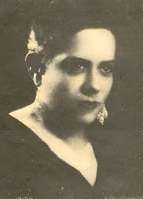Ernestina Lecuona

Ernestina Lecuona y Casado (16 January 1882 – 3 September 1951) was a Cuban pianist, music educator and composer.
Life
Ernestina Lecuona y Casado was born in Matanzas into a musical family. Her brother was pianist and composer Ernesto Lecuona. Leo Brouwer, a classical guitarist, was her grandson, and gymnast-political scientist Rafael A. Lecuona, an anti-communist, was her nephew. She studied music at the Centro Asturiano de La Habana and with French teacher Lucía Calderón.[1]
At the age of 15, Lecuona completed her first work Habanera Luisa, which was published widely in Cuba and Spain by Anselmo López in 1897. She gave early music lessons to her brother Ernesto, and in 1936 was invited to New York City by the Pan American Union, where she accompanied the Mexican tenor Tito Guizar. She made contact with singer Jessica Dragonette, who added some of Lecuona's works to her repertoire.[2]
In 1937 she founded a women's orchestra in Cuba, which debuted at the Teatro Alkazar, and in 1938 performed in concerts at the National Theatre. In 1939 she toured Mexico, Chile and Argentina and in 1940-42 traveled to South America again. She traveled with her brother on tour, and sometimes played with him as a duo for four hands at radio stations and concert venues including Carnegie Hall in 1948. She died in Havana.[3]
Works
Selected works include:
- Bolero
- Amarte es mi destino
- Anhelo besarte
- Mi sueño eres tú
- Mi vida es soñar
- No lo dudes
- ¿Por qué me dejaste?
- Te has cansado de mi amor
- ú serás en mis noches
- Tus besos de pasión
- Ya que te vas
- Canción-bolero
- Ahora que eres mío
- Te has cansado de mi amor
- Canción
References
- ↑ Sadie, Julie Anne; Samuel, Rhian (1994). The Norton/Grove dictionary of women composers (Digitized online by GoogleBooks). Retrieved 4 October 2010.
- ↑ Sanjurjo, Elena Pérez (1986). Historia de la música cubana.
- ↑ "Nombre:Ernestina Lecuona Casado". Retrieved 19 January 2011.